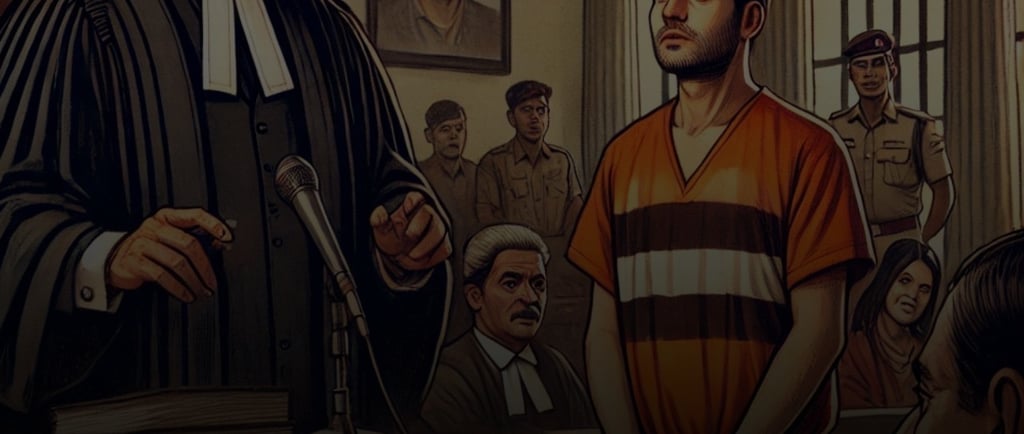Supreme Court Modifies Murder Conviction, Reduces Sentence to Time Served
New Delhi, March 21, 2025 – In a significant judgment, the Supreme Court of India modified the conviction of Sudam Prabhakar Achat, reducing his life imprisonment sentence under Section 302 of the Indian Penal Code (IPC) to a lesser charge under Section 304 Part I of IPC. The ruling effectively set the appellant free, as he had already served nearly seven years in custody.
4/24/20253 min read


New Delhi, March 21, 2025 – In a significant judgment, the Supreme Court of India modified the conviction of Sudam Prabhakar Achat, reducing his life imprisonment sentence under Section 302 of the Indian Penal Code (IPC) to a lesser charge under Section 304 Part I of IPC. The ruling effectively set the appellant free, as he had already served nearly seven years in custody.
The appeal, arising from a 2009 altercation in Malegaon, Maharashtra, questioned whether the accused’s actions constituted murder or culpable homicide not amounting to murder. The case revolved around a violent dispute between two agricultural families over shared resources, which tragically led to the death of one person.
Background of the Case
The case stemmed from a conflict between two families over the use of a common well and boundary in their adjoining agricultural fields in Sitane, Taluka Malegaon. The accused, Sudam Prabhakar Achat, and the deceased, Motiram Deoram Achat, were first cousins. Their families had long-standing disagreements over property and water usage.
On July 15, 2009, a verbal dispute escalated when the appellant allegedly hurled abuses at the complainant, Bapu Motiram Achat, over the use of the common boundary for an electric pump. When the complainant informed his parents, they confronted the accused at the field. This led to a violent scuffle in which Sudam, armed with a stick, and his father, Prabhat Deoram Achat, armed with an axe, attacked the complainant and his father.
The deceased sustained severe injuries and was rushed to a hospital in Malegaon before being transferred to a government hospital in Dhule, where he succumbed to his injuries later that night. A police complaint was registered, initially under Sections 323, 326, 504, and 506 read with Section 34 of IPC. Following the victim’s death, the charges were enhanced to Section 302 (murder).
Trial and High Court Proceedings
The trial court in Malegaon convicted Sudam Prabhakar Achat and his co-accused under Section 302 read with Section 34 IPC, sentencing them to life imprisonment. The court relied on the testimony of eyewitnesses, including family members of the deceased, and medical reports confirming that the injuries led to his death.
Sudam Achat subsequently appealed to the Bombay High Court, challenging his conviction. However, the High Court upheld the trial court’s ruling, affirming that the accused was guilty of murder.
Supreme Court's Analysis and Judgment
Dissatisfied with the High Court’s decision, Sudam Achat moved the Supreme Court, where his counsel argued that the incident was a result of a sudden altercation and not premeditated murder. The defense contended that:
The witnesses were relatives of the deceased and thus "interested witnesses," making their testimonies questionable.
The accused had no intention of killing the deceased, as indicated by the use of a stick and the blunt side of the axe rather than more lethal force.
The quarrel happened on the spot without prior planning, suggesting a case of culpable homicide rather than murder.
The prosecution countered by emphasizing that both lower courts had examined the evidence thoroughly and found the accused guilty of murder. They argued that the Supreme Court should not interfere with concurrent findings.
However, the Supreme Court noted key factors that suggested the incident fell under "culpable homicide not amounting to murder." It observed:
The fight took place in the heat of the moment due to a property dispute.
The weapons used were an ordinary stick and the blunt side of an axe, suggesting no intent to kill.
The appellant did not act with extreme cruelty or take undue advantage of the situation.
Given these considerations, the Court ruled that the offense did not meet the strict criteria for murder under Section 302 IPC. Instead, it invoked Exception IV of Section 300 IPC, which allows for the reduction of murder charges when a homicide occurs in the heat of the moment without premeditation.
Consequently, the Court modified the conviction from Section 302 IPC to Section 304 Part I IPC and sentenced Sudam Achat to the period already served—six years and ten months. The Court directed his immediate release.
Implications of the Verdict
This ruling highlights the Supreme Court’s emphasis on distinguishing between murder and culpable homicide. Legal experts note that this judgment underscores the importance of evaluating the intent behind an act rather than solely relying on the outcome.
By converting the charge and reducing the sentence, the Court acknowledged the role of sudden provocation in the altercation, a crucial element in determining culpability. The decision may set a precedent for similar cases involving spontaneous disputes leading to fatal outcomes.
For Sudam Prabhakar Achat and his family, the ruling brings an end to nearly 15 years of legal battles. However, for the deceased’s family, the decision is likely to be a matter of disappointment, as they had sought the upholding of the life sentence.
As the legal fraternity reflects on this case, it reinforces the Supreme Court’s role in balancing justice with the nuances of criminal intent.
